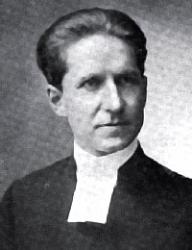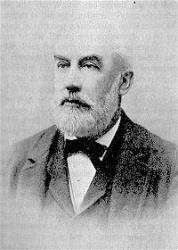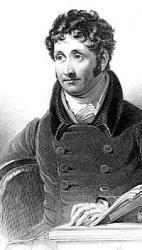Planning worship?
Check out our sister site, ZeteoSearch.org,
for 20+ additional resources related to your search.
- |
User Links
Person Results
William Knapp

1698 - 1768 Scripture: Isaiah 61:10 Composer of "WAREHAM" in The Presbyterian Book of Praise Born: 1698, Wareham, Dorsetshire, England.
Died: September 26, 1768, Poole, Dorsetshire, England.
Buried: Poole, Dorsetshire, England.
William Knapp
Henry Edward Dibdin
1813 - 1866 Person Name: H. E. Dibdin Scripture: Isaiah 61:10 Arranger of "SOLDAU" in The Presbyterian Book of Praise Dibdin, Henry Edward (1813–1866), musician, the youngest son of Charles Dibdin the younger [q. v.], born at Sadler's Wells 8 Sept. 1813, was taught music by his elder sister, Mary Anne (b. 1800), afterwards Mrs. Tonna, who was an excellent harpist and musician, and the composer of several songs and instrumental pieces. Dibdin studied the harp with her, and afterwards with Bochsa. He also performed on the viola and organ. His first public appearance took place at Covent Garden Theatre on 3 Aug. 1832, when he played the harp at Paganini's last concert. In 1833 he settled at Edinburgh, where he remained for the rest of his life, holding the honorary post of organist of Trinity Chapel, and occupied with private teaching and composition. In 1843 he published (in collaboration with J. T. Surenne) a collection of church music, a supplement to which appeared in the following year. His best known work is the ‘Standard Psalm Book’ (1852), an admirable collection, with a useful historical preface. In 1865 he also compiled another collection, ‘The Praise Book.’ His remaining published works, about forty in number, consist of songs, pianoforte and harp pieces, and a good many hymn tunes. Dibdin was also a skilled artist and illuminator. His death took place at Edinburgh 6 May 1866.
--en.wikisource.org/wiki/
Henry Edward Dibdin
Adolf Hult

1869 - 1943 Person Name: Adoft Hult Scripture: Isaiah 61:10 Composer of "MESSIAH" in The Hymnal and Order of Service Born: December 24, 1869, Moline, Illinois.
Adolf was the son of blacksmith Olof Hult, one of the early members of the Swedish colony in Moline. Adolf graduated from Augustana College in 1892, then earned his Bachelor of Divinity degree at Augustana Theological Seminary. Ordained June 11, 1899, at the synodical meeting in St. Paul, Minnesota, he became pastor of the Messiah English Lutheran Church in Lake View, Illinois, where had served a year while a student. During his pastorate, membership grew from 226 to over 450, making it the third largest English Lutheran church in the Chicago area.
Hult pursued postgraduate studies at the University of Chicago, and taught Hebrew for a year at the Chicago Lutheran Theological Seminary. He contributed numerous articles to the Lutheran press, and in 1905 was chief editor of I’äktaren, a religious paper published in Chicago. As of 1908, he was associate editor of The Young Lutheran’s Companion, published semi-monthly at Rock Island, Illinois.
In May 1907, Hult became pastor of the Immanuel Swedish Lutheran Church in Omaha, Nebraska.
--www.hymntime.org/tch
Adolf Hult
Ignaz Pleyel
1757 - 1831 Person Name: I. Pleyel Scripture: Isaiah 61:10 Composer of "GRACE CHURCH" in Laudes Domini Ignaz Joseph Pleyel; b. Ruppertstahl, near Vienna, 1757; d. Parice France, 1831
Evangelical Lutheran Hymnal, 1908
Ignaz Pleyel
E. H. Plumptre

1821 - 1891 Person Name: Edward H. Plumptre Scripture: Isaiah 61:10 Author of "Rejoice, O Pilgrim Throng!" in Moravian Book of Worship Edward H. Plumptre (b. London, England, August 6, 1821; d. Wells, England, February 1, 1891) was an eminent classical and biblical scholar who gained prominence in both church and university. Educated at King's College, London, and University College, Oxford, he was ordained in the Church of England in 1846. Plumptre served as a preacher at Oxford and a professor of pastoral theology at King's College, and held a number of other prestigious positions. His writings include A Life of Bishop Ken (1888), translations from Greek and Latin classics, and poetry and hymns. Plumptre was also a member of the committee that produced the Revised Version of the Bible.
Bert Polman
====================
Plumptre, Edward Hayes, D.D., son of Mr. E. H. Plumptre, was born in London, Aug. 6, 1821, and educated at King's College, London, and University College, Oxford, graduating as a double first in 1844. He was for some time Fellow of Brasenose. On taking Holy Orders in 1846 he rapidly attained to a foremost position as a Theologian and Preacher. His appointments have been important and influential, and include that of Assistant Preacher at Lincoln's Inn; Select Preacher at Oxford; Professor of Pastoral Theology at King's College, London; Dean of Queen's, Oxford; Prebendary in St. Paul's Cathedral, London; Professor of Exegesis of the New Testament in King's College, London; Boyle Lecturer; Grinfield Lecturer on the Septuagint, Oxford; Examiner in the Theological schools at Oxford; Member of the Old Testament Company for the Revision of the A.V. of the Holy Scriptures; Rector of Pluckley, 1869; Vicar of Bickley, Kent, 1873; and Dean of Wells, 1881.
Dean Plumptre's literary productions have been very numerous and important, and embrace the classics, history, divinity, biblical criticism, biography, and poetry. The list as set forth in Crockford's Clerical Directory is very extensive. His poetical works include Lazarus, and Other Poems, 1864; Master and Scholar, 1866; Things New and Old, 1884; and translations of Sophocles, Æschylus, and Dante. As a writer of sacred poetry he ranks very high. His hymns are elegant in style, fervent in spirit, and broad in treatment. The subjects chosen are mainly those associated with the revived Church life of the present day, from the Processional at a Choral Festival to hospital work and the spiritual life in schools and colleges. The rhythm of his verse has a special attraction for musicians, its poetry for the cultured, and its stately simplicity for the devout and earnest-minded. The two which have attained to the most extensive use in Great Britain and America are: Rejoice, ye pure in heart," and "Thine arm, O Lord, in days of old." His translations from the Latin, many of which were made for the Hymnary, 1871 and 1872, are very good and musical, but they have not been used in any way in proportion to their merits.
His original hymns in common use include:—
1. Behold they gain the lonely height. The Transfiguration. Written for and first published in the Society for Promoting Christian Knowledge Church Hymns, 1871.
2. For all Thy countless bounties. National Hymns. Written for the Jubilee of Queen Victoria, 1887, and set to music by C. W. Lavington. It was printed, together with the National Anthem adapted for the Jubilee, in Good Words, 1887.
3. Lo, summer comes again! Harvest. Written in 1871 for use at the Harvest Festival in Pluckley Church, Kent, of which the author was then rector, and published in the same year in the Hymnary, No. 466.
4. March, march, onward soldiers true. Processional at Choral Festivals. Written in 1867 for the tune of Costa's March of the Israelites in the Oratorio of Eli, at the request of the Rev. Henry White, Chaplain of the Savoy, and first used in that Chapel. It was subsequently published in the Savoy Hymnary, N.D. [1870], in 4 stanzas of 4 lines; in a Choral Festival book at Peterborough, and in the S. P. C. K. Church Hymns, 1871.
5. 0 Light, Whose beams illumine all. The Way, the Truth, and the Life. Written in May 1864, and published in his Lazarus, and Other Poems, 1864, as one of five Hymns for School and College. It passed into the 1868 Appendix to Hymns Ancient & Modern, and again into other collections.
6. 0 Lord of hosts, all heaven possessing. For School or College. Written in May, 1864, and published in his Lazarus and other Poems, 1864, in 5 stanzas of 6 lines.
7. 0 praise the Lord our God. Processional Thanksgiving Hymn. Written May 1864, and published in his Lazarus, and other Poems, 1864, in 4 stanzas of 8 lines. It is a most suitable hymn for Sunday school gatherings.
8. Rejoice, ye pure in heart. Processional at Choral Festival. Written in May 1865, for the Peterborough Choral Festival of that year, and first used in Peterborough Cathedral. In the same year it was published with special music by Novello & Co; and again (without music) in the 2nd edition of Lazarus, and Other Poems, 1865. It was included in the 1868 Appendix to Hymns Ancient & Modern with the change in stanza i., line 3, of "Your orient banner wave on high," to "Your festal banner wave on high." It is more widely used than any other of the author's hymns. Authorized text in Hymns Ancient & Modern.
9. Thine arm, 0 Lord, in days of old. Hospitals. Written in 1864 for use in King's College Hospital, London, and first printed on a fly-sheet as "A Hymn used in the Chapel of King's College Hospital." It was included in the 2nd edition of Lazarus, and Other Poems, 1865; in the 1868 Appendix to Hymns Ancient & Modern; the S. P. C. K. Church Hymns, 1871; Thring's Collection, 1882; and many others.
10. Thy hand, 0 God, has guided. Church Defence. Included in the 1889 Supplemental Hymns to Hymns Ancient & Modern The closing line of each stanza, "One Church, one Faith, one Lord," comes in with fine effect.
Dean Plumptre's Life of Bishop Ken, 1888, is an exhaustive and excellent work.
-- John Julian, Dictionary of Hymnology (1907)
===============
Plumptre, E. H., p. 897, i. Died at the Deanery, Wells, Feb. 1, 1891.
--John Julian, Dictionary of Hymnology, Appendix, Part II (1907)
E. H. Plumptre
Arthur Henry Messiter

1834 - 1916 Person Name: Arthur H. Messiter Scripture: Isaiah 61:10 Composer of "MARION" in Moravian Book of Worship Arthur H. Messiter (b. Frome, Somersetshire, England, 1834; d. New York, NY, 1916) Educated by private tutors in England, he, immigrated to the United States in 1863 and had an active musical career in Philadelphia, which included an organist position at St. James the Less. At Trinity Church in New York City, he modeled with distinction the British cathedral tradition of music. Messiter was an editor of the Episcopal Hymnal (1893), compiled the Psalter (1889) and Choir Office Book (1891), and wrote a musical history of Trinity Episcopal Church, New York (1906).
Bert Polman
Arthur Henry Messiter
Ralph Vaughan Williams

1872 - 1958 Person Name: Ralph Vaughan Williams, 1872-1958 Scripture: Isaiah 61:10 Composer of "MAGDA" in Common Praise Through his composing, conducting, collecting, editing, and teaching, Ralph Vaughan Williams (b. Down Ampney, Gloucestershire, England, October 12, 1872; d. Westminster, London, England, August 26, 1958) became the chief figure in the realm of English music and church music in the first half of the twentieth century. His education included instruction at the Royal College of Music in London and Trinity College, Cambridge, as well as additional studies in Berlin and Paris. During World War I he served in the army medical corps in France. Vaughan Williams taught music at the Royal College of Music (1920-1940), conducted the Bach Choir in London (1920-1927), and directed the Leith Hill Music Festival in Dorking (1905-1953). A major influence in his life was the English folk song. A knowledgeable collector of folk songs, he was also a member of the Folksong Society and a supporter of the English Folk Dance Society. Vaughan Williams wrote various articles and books, including National Music (1935), and composed numerous arrangements of folk songs; many of his compositions show the impact of folk rhythms and melodic modes. His original compositions cover nearly all musical genres, from orchestral symphonies and concertos to choral works, from songs to operas, and from chamber music to music for films. Vaughan Williams's church music includes anthems; choral-orchestral works, such as Magnificat (1932), Dona Nobis Pacem (1936), and Hodie (1953); and hymn tune settings for organ. But most important to the history of hymnody, he was music editor of the most influential British hymnal at the beginning of the twentieth century, The English Hymnal (1906), and coeditor (with Martin Shaw) of Songs of Praise (1925, 1931) and the Oxford Book of Carols (1928).
Bert Polman
Ralph Vaughan Williams
Thomas Campbell

1777 - 1844 Person Name: Thomas Campbell, 1777-1844 Scripture: Isaiah 61:10 Composer of "SAGINA" in Worship and Rejoice Campbell, Thomas, the Poet, has little in common with hymnody. A few of his pieces, including," When Jordan hushed its waters still," are found in a limited number of hymnals. His poetical works, The Pleasures of Hope, Gertrude of Wyoming, and others, have been reprinted several times. He was born at Glasgow, 1777; died at Boulogne, 1844, and was buried in Westminster Abbey.
--John Julian, Dictionary of Hymnology (1907)
Thomas Campbell
William T. Sleeper

1819 - 1904 Scripture: Isaiah 61:10 Author of "Jesus, I Come" in The Worshiping Church Sleeper, W. T. is given in I. D. Sankey’s Sacred Songs & Solos, 1881, as the author of “A ruler once came to Jesus by night” (Need for the New Birth).
--John Julian, Dictionary of Hymnology, Appendix, Part II (1907)
===============
William T. Sleeper (1819-1904)]
Born: February 9, 1819, Danbury, New Hampshire.
Died: September 24, 1904, Wellesley, Massachusetts.
Sleeper attended Phillips-Exeter Academy, the University of Vermont, and the Andover Theological Seminary. After ordination, he conducted home ministry work in Massachusetts and Maine. He later became pastor of the Summer Street Congregational Church in Worcester, Massachusetts, where he served over 30 years. His works include:
The Rejected King, and Hymns of Jesus, 1883.
-- www.hymntime.com
William T. Sleeper
George C. Stebbins

1846 - 1945 Scripture: Isaiah 61:10 Composer of "JESUS, I COME" in The Worshiping Church Stebbins studied music in Buffalo and Rochester, New York, then became a singing teacher. Around 1869, he moved to Chicago, Illinois, to join the Lyon and Healy Music Company. He also became the music director at the First Baptist Church in Chicago. It was in Chicago that he met the leaders in the Gospel music field, such as George Root, Philip Bliss, & Ira Sankey.
At age 28, Stebbins moved to Boston, Massachusetts, where he became music director at the Claredon Street Baptist Church; the pastor there was Adoniram Gordon. Two years later, Stebbins became music director at Tremont Temple in Boston. Shortly thereafter, he became involved in evangelism campaigns with Moody and others. Around 1900, Stebbins spent a year as an evangelist in India, Egypt, Italy, Palestine, France and England.
(www.hymntime.com/tch)
George C. Stebbins


 My Starred Hymns
My Starred Hymns


